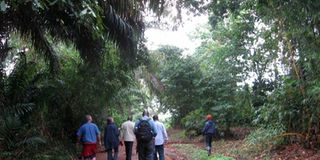Experience the thrill of nature walk

Nature lovers take a stroll through a section of the Entebbe Botanical Gardens during the nature walk last month. Photo by Paul Adude
What you need to know:
- The gardens are the centre for plant genetic resources with a collection of plants species from the tropical, sub-tropical and temperate zones, besides several shrubs and other plants regenerated naturally over the years.
- The Botanical Garden is more than 100 years old but has become more beautiful with age.
From searching for insects, to birds, to different plant species with their unique names, nature lovers last month braved the wet weather and ventured out in Entebbe Botanical Gardens, to indulge in nature.
One could not help being amused by names such as sansaverian (mother-in-laws tongue), calabash nut meg, fluff palm tree, canon ball tree, among others and eating wild fruits; mango steam and the brain fruit (meant to increase one’s intelligence once you eat it).
Jonathan Bushara, who took part in the nature walk, described his love for nature as a therapeutic experience that he developed interest in about five years ago. He is keen on bird watching.
“It is been two years of active involvement for me, spending a day in the jungle is really a thrill. I am still learning that there are many birds that look the same, but you still have to differentiate them. In childhood you knew that there was a bird called a parrot which mimics people, but now, you learn that there are several types of parrots. I hope to get more exposure and would really encourage everybody to join this adventure because it is relaxing,” he says.
For Alaine Roberts, an English woman residing at Mabamba Landing Site, but from neighbouring Kenya, her love for nature started at age five to date.
“Uganda is a wonderful place to interact with nature. The forests are endowed with different wildlife such as insects and birds,” she says.
Early training
Shaffic Shaban, a guide at the grounds commonly known as rafiki (Swahili for friend) developed his love for nature as a school boy.
“While I was in school we used to come here in our free time to swim but we were never interested in nature even then the security guards used to chase us. However, I would return time and again so they got tired of chasing me and they started asking for my assistance to care for the nursery beds and plants. That is when I started developing love for nature. I would show visitors around, especially those searching for medicinal plants and birders because I knew the best spots where birds would patch,” he says. Shaban got his knowledge from books and spending time at the gardens.
According to Sandra Sayuni, the support and coordinator official at Nature Uganda, nature walks such as this aim at imparting knowledge about nature to participants in the hope that when they get back home, they will impart this knowledge in their homes.
“Nature walk is all about coming out and letting your inner person interact freely with nature. We work with different likeminded organisations to engage in wild life conservation and research about nature,” she says.
The Entebbe Botanic Gardens, the oldest national botanical garden in Uganda is situated on the northern shores of Lake Victoria virtually on the equator.
It has a total land area of 40 hectares with a 1.5km walk along the Lake Victoria shoreline.
The gardens are the centre for plant genetic resources with a collection of plants species from the tropical, sub-tropical and temperate zones, besides several shrubs and other plants regenerated naturally over the years.
The Botanical Garden is more than 100 years old but has become more beautiful with age.




